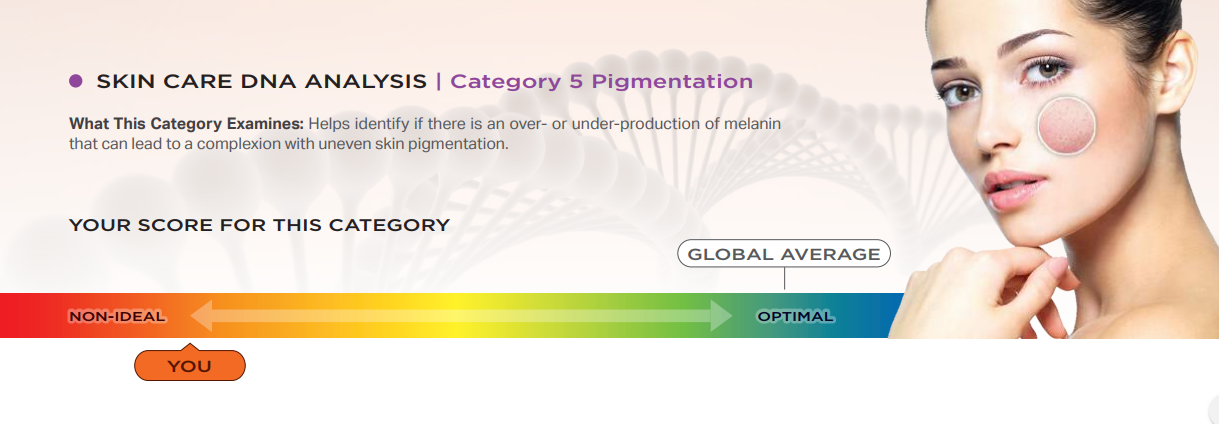SkinCareDNA Test
Price: SGD 490
Testing: Applicant only
Timeframe: 15 working days
The SkinCareDNA test we offer empowers you to take your skin care regime to the next level. Those early signs of ageing, wrinkling, and pigmentation can now become a thing of the past thanks to a simple DNA test that can unveil the path to more supple and healthier looking skin. Your future looks are encoded deep within your genes and it your very genes that will determine how genetically armed you are to fight the effects of ageing. Dermatologists, skin care specialists, beauticians and celebrities are touting the benefits and advantages of the DNA skin testing.
View a sample result by clicking the below image:

Why Should I Take a Skin DNA Test?
Most skin care therapists can only go as far as skin mapping. Skin mapping is useful and many leading skin care product companies offer skin or face mapping in order to help you choose the right skin care product. But analysing ones’ face is only a small part of the picture and will tell us very little about what our future skin will look like and whether we are really doing the very best for our skin. The SkinCareDNA test is the next step up in building a true, personalised skin care regime.
Are You Genetically Predisposed to Premature Ageing and Wrinkling?
No matter how old or young you are, it is never too late to begin looking after your skin and making some real investments in it.
Through a skin DNA test you will find out how well equipped you are genetically to fighting the typical signs of ageing. This is because your genes ultimately determine how your skin will age. This test will establish your SkinCareDNA test ID showing whether you are at high risk, low risk or medium risk of the following:
• Wrinkles and fine lines: Advanced Glycation End products (A.G.E.) are the result of glucose driven processes. Our intake of sugars in the form of glucose is ultimately harmful for the skin and contributes to wrinkling. It is however, impossible to avoid A.G.Es although we can limit their harmful effects by altering our diets, the body still naturally produces A.G.Es as a result of metabolic processes.
• Sun protection: Our bodies are equipped to fight ultraviolet radiation such as UVA and UVB which can damage the skin. However, individuals may exhibit variations in their ability to break down photoproducts.
• Skin Sensitivity: Your body naturally fights inflammation and protects you against sensitivity; however, some people have naturally sensitive skins which are vulnerable to stress. Understanding whether you carry the genes which make you more likely to suffer from skin sensitivity is a first step in managing the problem.
• Skin Elasticity: the plump, smooth look which is typical of young skin is due to the collagen in it. Knowing the right care to undertake can restore elasticity but first and foremost, you need to know whether you carry any genes which predispose you to a loss of elasticity. This loss is often caused by enzymes which are naturally present on our bodies known as MMPs (Matrix Metalloproteinase). Some individuals may however, have overactive enzymes.
• Pigmentation: Ultraviolet light is extremely damaging to our skin and accounts for 95% of the skin damage. The effect of sun damage is cumulative and irreversible. Not all of us will however, exhibit the same intensity of damage even if we have been exposed to the same amounts of sunlight. Excessive melanin production or under melanin production will determine the extent of pigmentation in an individual.
• Collagen quality: Collagen is a protein that plays a vital role in healthy, radiant skin. Collagen is naturally produced by the body but the quality and quantity is affected by genetic makeup as well as by age. Certain genetic variations can affect the quality of collagen and establishing if you are at an increased genetic risk is important if you want to take action.
• Antioxidants: Free radicals are particles that float around our system. Free radicals are highly damaging but kept at check by the anti-oxidant genes in our bodies. Some individuals carry genetic variations which can lower their natural ability to fight the free-radicals that pelt our skin.
For each of these categories you will be given a genetic score.
The Science Behind the Test
A small percentage of our DNA is unique and it is this unique part of our DNA that could make us predisposed to disease or to factors related to skin ageing. Scientists today understand more about these genetic variations and how they affect us on an individual level. These genetic variations that are unique to each one of us are known as SNPs (an acronym for Single Nucleotide Polymorphisms). The key to understanding SNPs is knowing that these SNPs can affect normal gene functioning and if gene functioning is compromised then you might be a victim of accelerated ageing.
Collecting DNA Samples
DNA samples for the SkinCareDNA test are collected using a kit. We will send your kit as soon as we have processed your payment. Rubbing the swabs inside the mouth for just ten seconds will cause dead cheek cells to adhere to the swab. These cheek cells can then be extracted from the swabs and the DNA inside these cells analysed for your skin DNA test. Just one quick rub will result in millions of cells transferring onto the surface of the swab. The process is painless and quick. Our kit will contain the instructions and precautions to follow when collecting your DNA samples.
FAQs
I take really good care of my skin, do I need this test?
Yes, you do. Skin care is more complex than just picking creams based upon whether your skin is oily, dry, sensitive or combination. If you want long lasting results, you need to begin to look at and understand how genetic factors impact the ageing process. With the SkinCareDNA test you are grabbing the bull by the horns, developing the most current and up to date, targetted approach to skin care.
What is the ideal age to take this test? Am I too Old?
Maximising skin care can begin at any point in your life. Our skin is constantly ageing, irrespective of how old you are. You can begin slowing down the ageing process and the signs of ageing at any point in your life.




